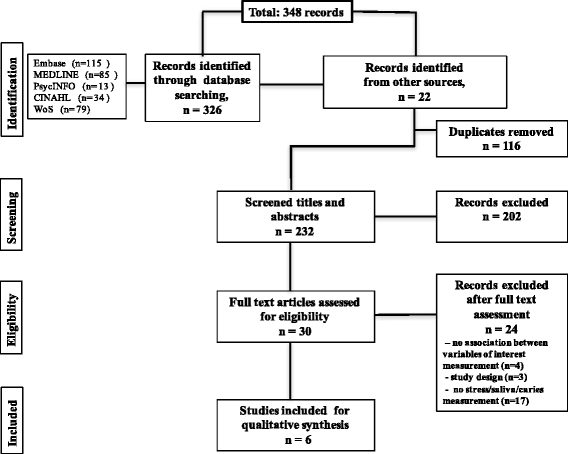Investigating the association between stress, saliva and dental caries: a scoping review
- PMID: 29534715
- PMCID: PMC5851323
- DOI: 10.1186/s12903-018-0500-z
Investigating the association between stress, saliva and dental caries: a scoping review
Abstract
Background: This scoping review addressed the question 'what do we know about stress-related changes in saliva and dental caries in general population?'
Methods: The review was conducted using electronic searches via Embase, MEDLINE, PsycINFO, CINAHL and WoS. All published human studies with both observational and experimental designs were included. Two reviewers independently reviewed eligible articles and extracted the data. The studies' quality was assessed using the Effective Public Health Practice Project Quality Assessment Tool.
Results: Our search identified 232 reports, of which six were included in this review. All six studies were conducted in children and used salivary cortisol as stress marker. The studies varied by design, types of stressors, children's caries experience, methods of saliva collection. Four studies reported a positive association between saliva cortisol levels and caries (p < 0.05) while the other two reported no association (p > 0.05). The quality of the included studies was weak to moderate.
Conclusions: There is lack of evidence about an association between stress-related changes in saliva and caries. Well-designed longitudinal studies with rigorous measurement technics for stress, saliva and dental caries are necessary. This will help to generate new insights into the multifactorial etiology of caries and provide evidence for a rational method for its control.
Keywords: Anxiety; Dental caries; Depression; Psychological stress; Saliva.
Conflict of interest statement
Ethics approval and consent to participate
Not applicable.
Consent for publication
Not applicable.
Competing interests
The authors declare that they have no competing interests.
Publisher’s Note
Springer Nature remains neutral with regard to jurisdictional claims in published maps and institutional affiliations.
Figures
Similar articles
-
Social inequalities in childhood dental caries: the convergent roles of stress, bacteria and disadvantage.Soc Sci Med. 2010 Nov;71(9):1644-52. doi: 10.1016/j.socscimed.2010.07.045. Epub 2010 Sep 15. Soc Sci Med. 2010. PMID: 20870333 Free PMC article.
-
Association between environmental stress factors, salivary cortisol level and dental caries in Egyptian preschool children: a case-control study.Sci Rep. 2025 Apr 1;15(1):11063. doi: 10.1038/s41598-025-94327-0. Sci Rep. 2025. PMID: 40169691 Free PMC article.
-
Salivary cortisol response to psychological stress in children with early childhood caries.Indian J Dent Res. 2010 Apr-Jun;21(2):231-7. doi: 10.4103/0970-9290.66642. Indian J Dent Res. 2010. PMID: 20657093
-
The Association between Lead Exposure and Dental Caries: A Systematic Review.Caries Res. 2024;58(3):141-152. doi: 10.1159/000537826. Epub 2024 Feb 14. Caries Res. 2024. PMID: 38354711
-
Salivary proteins and peptides in the aetiology of caries in children: Systematic literature review.Oral Dis. 2019 May;25(4):1048-1056. doi: 10.1111/odi.12953. Epub 2018 Sep 6. Oral Dis. 2019. PMID: 30091198
Cited by
-
Potential Novel Strategies for the Treatment of Dental Pulp-Derived Pain: Pharmacological Approaches and Beyond.Front Pharmacol. 2019 Sep 18;10:1068. doi: 10.3389/fphar.2019.01068. eCollection 2019. Front Pharmacol. 2019. PMID: 31620000 Free PMC article. Review.
-
Association between Salivary Cortisol Levels, Dental Anxiety, and Dental Caries in Children: A Cross-Sectional Study.Dent J (Basel). 2023 Aug 29;11(9):205. doi: 10.3390/dj11090205. Dent J (Basel). 2023. PMID: 37754325 Free PMC article.
-
Cross-sectional associations between effort-reward imbalance at work and oral diseases in Japan.PeerJ. 2022 Jul 21;10:e13792. doi: 10.7717/peerj.13792. eCollection 2022. PeerJ. 2022. PMID: 35891644 Free PMC article.
-
Childhood Socioeconomic Status Affects Dental Pain in Later Life.JDR Clin Trans Res. 2025 Apr;10(2):135-145. doi: 10.1177/23800844241271740. Epub 2024 Sep 26. JDR Clin Trans Res. 2025. PMID: 39324474 Free PMC article.
-
The Effect of Dental Treatments in Caries Management on Stress and Salivary Protein Levels.J Clin Med. 2022 Jul 27;11(15):4350. doi: 10.3390/jcm11154350. J Clin Med. 2022. PMID: 35893440 Free PMC article.
References
Publication types
MeSH terms
Substances
LinkOut - more resources
Full Text Sources
Other Literature Sources
Medical


